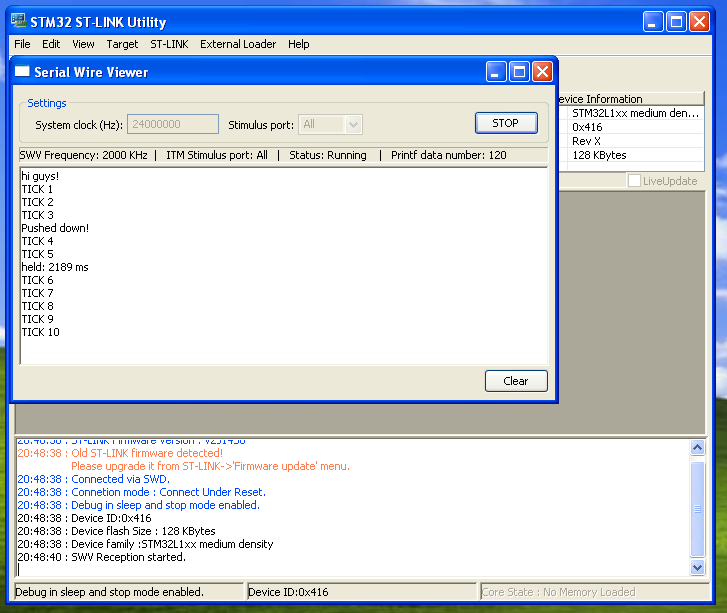This is a braindump post, probably of very little interest to anyone but myself. It outlines further adventures towards getting a plain linux system booted on a minix neo x5 mini.
rk3066 support is expanding in the bleeding edge linux trees, and seeing as I don’t care about HDMI (yet) for my purposes, I thought it would be a good way to go forward. Device tree support, recent, near vanilla code, a snowflakes chance of getting a patch to work, and a single clear path to upstream. Of course, I thought for practice, I should start with one of the existing “gpl release” trees, all built on 3.0.x. That was an adventure. I tried the “omegamoon” repository, which _seemed_ to be the most uptodate, with backports of “important” things. https://github.com/omegamoon/Rockchip-GPL-Kernel
We ignore all the build script crap, at least until we’ve looked at them all, because we’re trying to work out what they’re doing, not just monkeys on keyboards.
$ export ARCH=arm
# This line your toolchain, mine is from "yum install gcc-arm-linux-gnu" on fedora 20
# Note, that you can actually skip this with the right entries in your .config
$ export CROSS_COMPILE=arm-linux-gnu-
In any tree, have a look in arch/arm/configs for an appropriate defconfig for your device…. (This is where it gets fun!)
So, let’s start with something basic
make rk3066b_sdk_defconfig
# now we would need to go into menuconfig and make sure we've turned on drivers we might need....
# but let's just build this one first and see what we get....
make -j8
And… it fails here. Awesome. Turns out all the 3066 configs here don’t even compile, presumably because of rk3188 support getting patched in, without any testing. so, toss this repo out and try another…
We’re going back to a “clean” rk3066 tree, following the directions here: http://hwswbits.blogspot.com/2013/11/linux-on-ug008-tv-box-rk3066.html This site has been generally helpful, and the ug008 is a very similar device to the minix neo x5 mini. I originally intended to go all the way back to basics, just follow any build guide first, make sure the code worked as is, before I tried anything more specific to the x5mini.
git clone https://github.com/Galland/rk3x_kernel_3.0.36 galland-rk
cd galland-rk
cp galland.config .config
make menuconfig
General Setup->Cross Compiler tool prefix -> Update the prefix so you don't have to export CROSS_COMPILE...
make
watch it fail…
/home/karlp/projects/galland-rk3x-3.0.36/scripts/gen_initramfs_list.sh: Cannot open '../initramfs/initramfs.cpio'
Ok, that was clearly skipping steps. Why do I need a damn initramfs, I just want to build in the modules I need in one go! But, ok, we’re going to follow the instructions given.
clone galland initramfs image, choose to use the one with rk mtd nand support, as we are hoping eventually to get linux, not android. rebuild
watch it fail, no uudecode. wtf?! and yum search uudecode only turns up a perl module?! Turns out you need the sharutils package. Ok, my bad, this was listed at the top of galland’s page of requirements. No idea why I haven’t had this installed already before, but so be it, install and make again…
Realise it doesn’t compile either. Bugs in the drivers/mtk_wcn_combo/drv_wlan/wlan/common/wlan_lib.c file. Awesome. I did consider resetting this repository to the date the blog post was written, and also looked at the rest of the forks, but ultimately decided, I wasn’t interested in trying this any further, they were all deadends. On to “near” mainline.
from #linux-rockchip on freenode, on earlier discussions I’d come across a more recent repo, on kernel.org no less, from one of the people who’s involved in mainlining efforts for rockchip support.
So, this is now…. _very recent_
Git repo: git://git.kernel.org/pub/scm/linux/kernel/git/mmind/linux-rockchip.git
Branch: v3.17-next/rk3xxx-dts
I’ve hacked a .config together, but I don’t know if it’s worth sharing at this point. So many options!
make -j8
# That spat out arch/arm/boot/zImage
make scripts # This makes the dts/dtb compiler
make rk3066a-bqcurie2.dtb # The only rk3066 in the tree, this is where I'll eventually have to make one for the minix neox5 mini
# that spat out arch/arm/boot/rk3066a-bqcurie2.dtb
cat arch/arm/boot/zImage arch/arm/boot/rk3066a-bqcurie2.dtb > zImage_with_dtb
[rktools]/rkcrc -k zImage_with_dtb > kernel.img
rkflashtool w kernel kernel.img (Or flashkit, or whatever)
Yay, now we actually get a booting kernel that we built ourselves….
425482 Starting kernel...@0x60408000
Uncompressing Linux... done, booting the kernel.
Booting Linux on physical CPU 0x0
Linux version 3.16.0-rc3 (karlp@teros) (gcc version 4.8.2 20140120 (Red Hat 4.8.2-2) (GCC) ) #1 SMP Wed Jul 30 21:08:48 GMT 2014
CPU: ARMv7 Processor [413fc090] revision 0 (ARMv7), cr=10c53c7d
CPU: PIPT / VIPT nonaliasing data cache, VIPT aliasing instruction cache
Machine model: bq Curie 2
..... snip....
Please append a correct "root=" boot option; here are the available partitions:
Kernel panic - not syncing: VFS: Unable to mount root fs on unknown-block(0,0)
CPU: 1 PID: 1 Comm: swapper/0 Not tainted 3.16.0-rc3 #1
..... snip (same on cpu2) ....
whee, that’s actually doing the right thing. It actually gets all the way to failing to mount a rootfs, which is reasonable, as I hadn’t configured one, mounted one, or set anything up on an sd card. So, I guess next, we’re looking at making at least a stub rootfs, and looking at maybe a more specific device tree file for this hardware.
Note: If you don’t concat the DTS to the end of zImage, you’ll get a boot something like this…
424337 Starting kernel...@0x60408000
Uncompressing Linux... done, booting the kernel.
Error: unrecognized/unsupported machine ID (r1 = 0x00000bfa).
Available machine support:
ID (hex) NAME
ffffffff Generic DT based system
ffffffff Rockchip Cortex-A9 (Device Tree)
Please check your kernel config and/or bootloader.
A good write up of this is at http://billauer.co.il/blog/2014/02/uboot-linux-dtb-fdt-device-tree/
